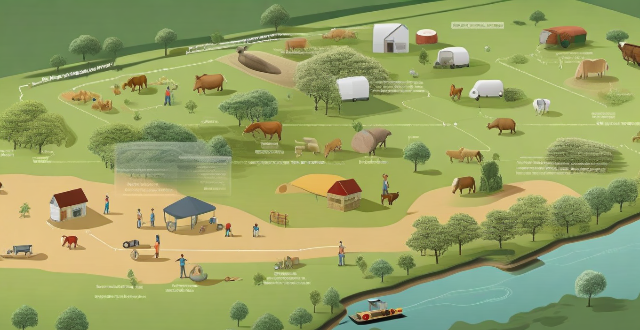The article discusses the economic consequences of climate change, including its impact on agriculture, tourism, energy, and infrastructure. In agriculture, decreased crop yields, loss of biodiversity, and increased extreme weather events can lead to higher food prices and reduced agricultural income for farmers. In tourism, loss of natural attractions, changes in seasonality, and health risks can result in reduced tourism revenue for affected regions. In energy, increased demand for cooling systems, disruption of energy production facilities, and transition to renewable energy sources can create new economic opportunities but also require significant investment and adaptation. In infrastructure, damage to critical infrastructure like roads, bridges, and buildings can result in costly repairs and replacements for governments and private sector organizations. Addressing these challenges requires coordinated action by governments, businesses, and individuals to reduce greenhouse gas emissions and adapt to the changing climate.

Economic Consequences of Climate Change
Climate change is a global phenomenon that has far-reaching economic consequences. It affects various sectors, including agriculture, tourism, energy, and infrastructure, among others. In this article, we will discuss the economic implications of climate change in detail.
Impact on Agriculture
* Decreased Crop Yields: As temperatures rise, crop yields may decline due to reduced water availability and increased pest and disease pressure. This can lead to higher food prices and reduced agricultural income for farmers.
* Loss of Biodiversity: Climate change can also cause the loss of biodiversity, which is essential for maintaining ecosystem services such as pollination and soil fertility. This can have negative impacts on agricultural productivity and food security.
* Increased Extreme Weather Events: Extreme weather events like droughts, floods, and storms can damage crops and infrastructure, leading to significant economic losses for farmers and rural communities.
Impact on Tourism
* Loss of Natural Attractions: Rising sea levels, melting glaciers, and other climate-related changes can threaten natural attractions that are critical to the tourism industry. This can result in reduced tourism revenue for affected regions.
* Changes in Seasonality: Climate change can alter seasonal patterns, affecting the timing of peak tourist seasons. This can lead to shifts in demand and potential economic losses for businesses that rely on tourism.
* Health Risks: Climate change can exacerbate health risks associated with outdoor activities, such as heat stroke or dehydration. This can deter tourists from visiting certain destinations and negatively impact tourism revenue.
Impact on Energy
* Increased Demand for Cooling: As temperatures rise, there may be an increased demand for cooling systems like air conditioning. This can lead to higher energy consumption and costs, particularly in regions with limited access to affordable electricity.
* Disruption of Energy Production: Extreme weather events like hurricanes or wildfires can disrupt energy production facilities, leading to power outages and economic losses for energy companies and consumers alike.
* Transition to Renewable Energy: The transition to renewable energy sources like wind and solar power can create new economic opportunities but also require significant investment and adaptation by governments, businesses, and individuals.
Impact on Infrastructure
* Damage to Infrastructure: Rising sea levels, flooding, and other climate-related hazards can damage critical infrastructure like roads, bridges, and buildings. This can result in costly repairs and replacements for governments and private sector organizations.
* Adaptation Costs: To mitigate the impacts of climate change, governments and businesses may need to invest in adaptation measures such as building sea walls or elevating buildings. These investments can be costly but necessary to protect against future damage.
* Insurance Costs: As climate-related risks increase, insurance premiums may rise to reflect the increased likelihood of claims related to extreme weather events or other climate-related damages. This can add additional financial burdens for individuals and businesses.
In conclusion, climate change has significant economic consequences that span multiple sectors and impact both developed and developing countries. Addressing these challenges requires coordinated action by governments, businesses, and individuals to reduce greenhouse gas emissions and adapt to the changing climate.